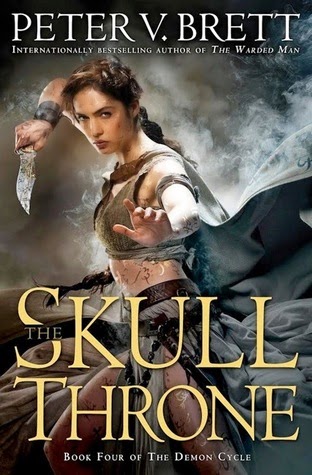Disclaimer: I received an ARC of this title from the publisher in exchange for review consideration. While I make every attempt to avoid spoilers, please be aware that an ARC synopsis, press release, or review request may disclose details that are not revealed in the published cover blurb.
The first three Demon Cycle novels were stories of heroes. Through them, we confronted the age-old question of whether heroes are born, or whether they are made. They were also, at their heart, stories of betrayal. In them, we bore witness to two men, friends and allies, who turned upon one another in a battle to be named The Deliverer. We watched as one betrayed the other in a desperate attempt to claim that title, and then watched as the other betrayed everything he'd been taught, just to survive and fight another day. Standing between them, one woman manipulated her interpretations of fate and foretelling, sparking those very betrayals. Each of these three - Jardir, Arlen, and Inerva - had a chance to tell their own stories, to show us precisely how they arrived at those betrayals, with novels that largely revolved around them.

With this fourth volume, Peter V. Brett turns that betrayal outward, going against all that we've come to expect of the series. There's no opening flashback to flesh out a fourth character, meaning that neither Leesha nor Reena gets elevated to Inerva's status, as we could be forgiven for having expected. The heroes, Jardir and Arlen, are forced back into an awkward and tenuous alliance, and then kept largely off the page, denying their people leadership when they need it most. Into that void of leadership, cultures come to clash, with betrayals within and without defining the conflict.
It's a risky move, and one that is likely to frustrate some readers, but it works - it really works. Not only does Brett open up the world and broaden the scope with The Skull Throne, but he breathes new life and new excitement into a series that, suddenly, no longer seems to be heading for such an inevitable conclusion. There's new doubt cast upon the very idea of The Deliverer, the nature of good versus evil, and our assumptions about the desert dwellers and the greenlanders.
Aside from a few scenes that resolve the cliffhanger of The Daylight War, the first half of the novel is split between events in Krasia and Cutter's Hollow. Brett uses the opportunity to flesh out the supporting cast, refining some and re-establishing others, while giving us new insights into how life goes on for those who travel in a hero's wake. Personally, I found the desert scenes far more interesting, especially in the way he deals with the politics of gender, family, and power. Inerva and Abban both have important roles to play, although they're no long as firmly in control as we once believed, while Jayan or Asome both get some intriguing story arcs in their attempt to position themselves for their father's throne.
The scenes in the Hollow actually grated on my nerves a bit, particularly those dealing with Leesha and her romantic entanglements, but it's worth suffering through to see what Brett does with Thamos' awkward situation. It's the whole situation with Rojer and his wives, however, that really makes the Hollow portion of the tale. As much as he frustrated me at times with his insistence on being noble and fair, I admired Rojer a great deal and looked forward to his scenes. Amanvah and Sikvah become legitimate characters in their own right, elevating a situation that was previously played for comedy to something significant and profound, while Kendall has a surprising role to play as well.
Without giving away the 'why' and the 'how' of it, the second half of the novel deals directly with the clash of cultures and the battle over ideas. It's epic, it's violent, and it's filled with more betrayals than you can count. Despite what you might be thinking after the first half, especially given the size of the book, this is not just an attempt to pad the story and squeeze out another book. Big stuff happens here. Important stuff. Crucial stuff. Up until now, the fate of mankind has rested almost solely on the shoulders of Jardir and Arlen, but no longer. We'll have to wait and see what the true consequences of this book will be, but the world we're left with at the end is not the one our heroes began fighting for. Sadly, we'll be a few heroes (and villains) short going into the last book, but those wounds are far too fresh for me to even dance around, much less tease or spoil. All I will say is that these are not cheap deaths - they happen on the page, in full view of the reader, and they're as horrible and heartbreaking as you could possibly fear (or hope).
Ironically, for a book where the demons take a back seat to the evils of man, those very same demons are the one flaw in the story for me. We'll have to wait and see how Brett develops what he started here, but I'm a bit uncomfortable with how he shifted them from monsters to enemies. The Skull Throne lets us inside their heads, and I think that takes away from the awe and the terror. Having said that, there's a throwaway line towards the end the really intrigued me, leaving me to wonder how he'll reconcile history and mythology in the final book . . . but you'll just have to read it for yourself.
Hardcover, 704 pages
Expected publication: March 31st 2015 by Del Rey
© 2015 Beauty in Ruins All Rights Reserved











